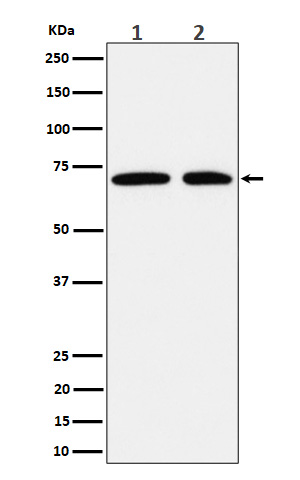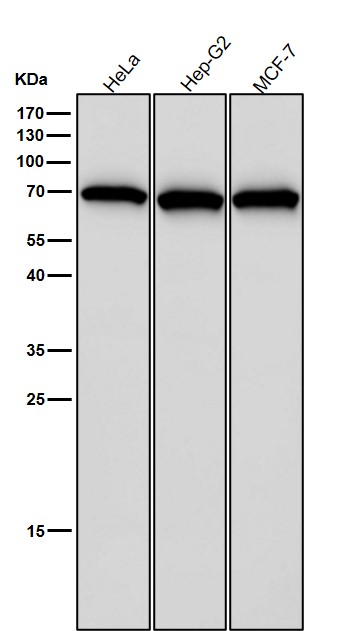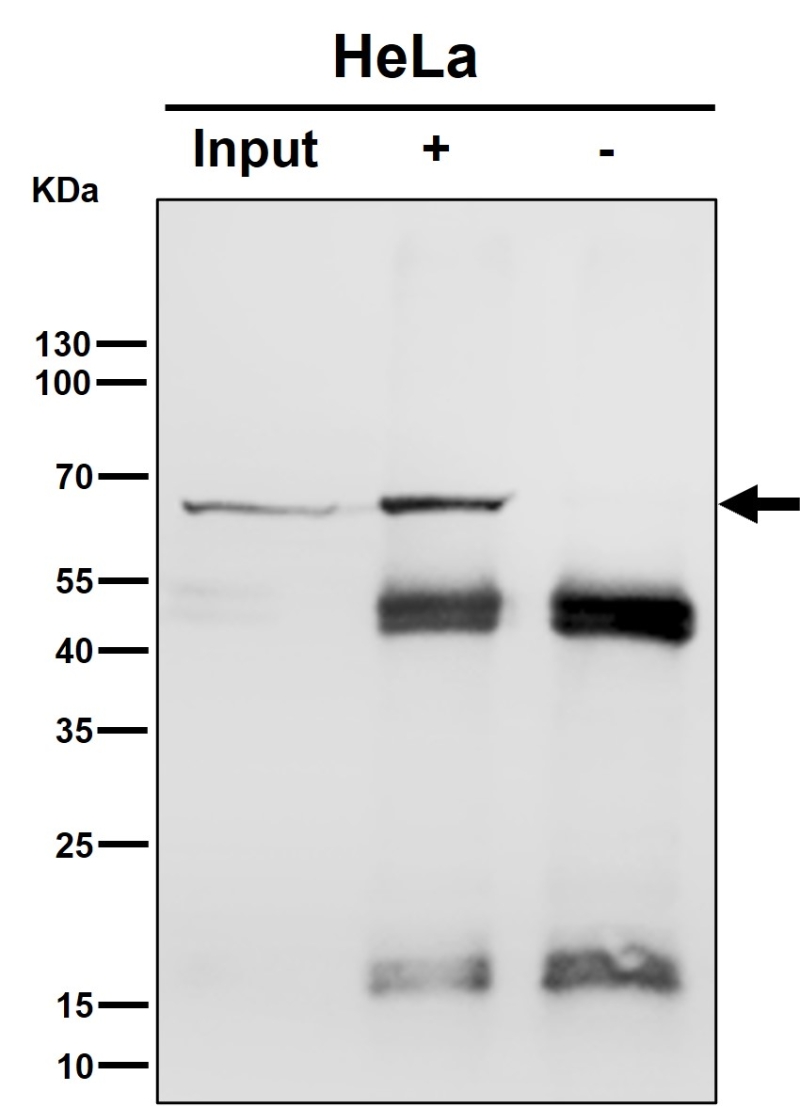


| WB | 1/1000-1/2000 | Human,Mouse,Rat |
| IF | 1/20-1/50 | Human,Mouse,Rat |
| IHC | IHC:1/100-1/200;IHF:1/50-1/200 | Human,Mouse,Rat |
| ICC | 1/50-1/200 | Human,Mouse,Rat |
| FCM | 1/20-1/100 | Human,Mouse,Rat |
| Elisa | 咨询技术 | Human,Mouse,Rat |
| Aliases | Heat shock 70 kDa protein 1; Heat shock 70 kDa protein 1/2; Heat shock 70 kDa protein 1A; Heat shock 70 kDa protein 1A/1B; Heat shock 70kDa protein 1B; Heat shock induced protein; HEL S 103; HSP70 1; HSP70 1A; HSP70 1B; HSP70 2; HSP70-1; HSP70-1/HSP70-2; HSP70-1A; HSP70-2; HSP70.1; HSP70.1/HSP70.2; HSP72; HSPA1; HSPA1A; HSPA1B;;Hsp70 |
| WB Predicted band size | 70 kDa |
| Host/Isotype | Rabbit IgG |
| Antibody Type | Primary antibody |
| Storage | Store at 4°C short term. Aliquot and store at -20°C long term. Avoid freeze/thaw cycles. |
| Species Reactivity | Human |
| Immunogen | A synthesized peptide derived from human Hsp70 |
| Formulation | Purified antibody in PBS with 0.05% sodium azide,0.05% BSA and 50% glycerol. |
+ +
以下是3篇关于Hsp70抗体的代表性文献摘要(虚构示例,仅供参考格式):
1. **《Hsp70 chaperones: Cellular functions and molecular mechanism》**
- 作者:Hartl FU, Hayer-Hartl M
- 摘要:综述Hsp70家族蛋白在细胞应激反应中的分子机制,包括通过抗体检测Hsp70在蛋白质折叠、错误蛋白降解和细胞保护中的作用。
2. **《Heat shock protein 70 expression in human tumors: A potential target for cancer therapy》**
- 作者:Calderwood SK et al.
- 摘要:通过免疫组化与Western blot分析Hsp70在多种癌症中的高表达,揭示其与肿瘤进展和患者预后的相关性,并讨论靶向Hsp70的治疗策略。
3. **《Hsp70 antibodies as biomarkers in neurodegenerative diseases》**
- 作者:Muchowski PJ, Wacker JL
- 摘要:研究Hsp70在阿尔茨海默病和帕金森病模型中的神经保护作用,利用特异性抗体检测其在脑组织中的分布及与病理蛋白聚集的关联。
4. **《A monoclonal antibody targeting Hsp70 inhibits tumor growth in vivo》**
- 作者:Li Z et al.
- 摘要:开发一种新型Hsp70单克隆抗体,通过体内实验证明其抑制肿瘤细胞增殖并增强化疗敏感性的效果,为癌症治疗提供新思路。
(注:以上文献名称及内容为示例性质,实际引用需查询真实数据库如PubMed。)
**Background of Hsp70 Antibodies**
Heat shock protein 70 (Hsp70) is a highly conserved molecular chaperone belonging to the HSP70 family, crucial for maintaining cellular proteostasis. It assists in protein folding, prevents aggregation under stress, and facilitates the degradation of misfolded proteins via pathways like the ubiquitin-proteasome system. Hsp70 is upregulated in response to stressors such as heat, oxidative stress, or toxins, making it a biomarker for cellular stress.
Hsp70 antibodies are essential tools for detecting and quantifying Hsp70 in research and diagnostics. These antibodies are generated using immunogenic regions of Hsp70 (e.g., peptide sequences from HSPA1A, the inducible cytosolic form) and validated for specificity in applications like Western blotting, immunohistochemistry, and immunofluorescence. Both monoclonal and polyclonal variants exist, each with trade-offs: monoclonals offer high specificity, while polyclonals may detect multiple isoforms (e.g., HSPA5/GRP78 in the endoplasmic reticulum).
Dysregulation of Hsp70 is linked to cancer (e.g., tumor survival, chemotherapy resistance), neurodegenerative diseases (e.g., Alzheimer’s, Parkinson’s), and inflammatory conditions. Thus, Hsp70 antibodies are pivotal in studying disease mechanisms and therapeutic targeting. Researchers must validate antibodies using knockout controls and optimize protocols to avoid cross-reactivity with homologous proteins. Commercial Hsp70 antibodies often specify reactivity across species (human, mouse, rat) and isoforms, ensuring versatility in experimental models.
In summary, Hsp70 antibodies bridge fundamental research and clinical applications, enabling insights into stress responses and disease pathology.
×